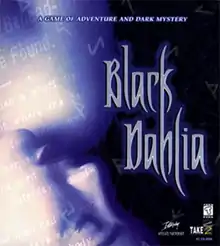Black Dahlia (video game)
Black Dahlia is an interactive movie point-and-click adventure game that was released on February 25, 1998 by Take-Two Interactive.
| Black Dahlia | |
|---|---|
 | |
| Developer(s) | Take-Two Interactive |
| Publisher(s) | |
| Designer(s) | Steve Glasstetter |
| Programmer(s) | Greg Brown |
| Artist(s) |
|
| Writer(s) | Patrick Freeman |
| Composer(s) | Michael Bross |
| Platform(s) | Microsoft Windows |
| Release | |
| Genre(s) | Interactive movie, Point-and-click adventure |
| Mode(s) | Single-player |
The story, while fictional, is inspired by the real life Cleveland Torso Murderer and the infamous murder of Elizabeth Short in Los Angeles.
This interactive movie point-and-click adventure game ties Elizabeth Short's murder to Nazis and occult rituals which the player has to investigate. The game featured two major Hollywood actors, Dennis Hopper and Teri Garr.
Plot
Agent Pearson is the newest member of the COI, and is somewhat dejected to find the job not as glamorous as he was initially told. After being given a case where a local munitions manufacturer was invited to join the Brotherhood of Thule, an American branch of the Thule society, Pearson is puzzled by the apparent connections with Nazi occultism. Along the way he encounters Agent Winslow, apparently a bumbling Federal agent who is more concerned with his press appearance than solving cases.
After making a connection between the Brotherhood of Thule and the Cleveland torso murders, Pearson leads a local detective to the butchers lair after finding bizarre Gaelic documents left by his predecessor regarding a ritual involving Odin and a gemstone called the Black Dahlia, which is a key instrument that can render a ritual user the ability to control dreams.
Years later, Pearson is a member of the OSI, and recovers the Dahlia from a Nazi bunker, but it is quickly snatched away and then sold on the black market by a corrupt quartermaster. Following the Dahlia, Pearson again encounters Winslow, a Nazi SS operative following the final orders of Hitler to perform the Dahlia ritual.
Pearson pursues Winslow across the US, finally cornering him in a California home, where Winslow has just completed the final ritual murders regarding the Dahlia. After tearing out his own eye and performing the remainder of the ritual, the player has one choice with his pistol. If he shoots Winslow or hesitates, Winslow stabs himself, and possesses Pearson, becoming an American version of Hitler, and able to control large portions of the populace through their dreams. If Pearson destroys the Dahlia, Winslow dies and Pearson is blamed for the locals spree of killings, though he is overjoyed and content with having stopped the Nazi plot to take over the world.
Reception
| Aggregator | Score |
|---|---|
| GameRankings | 72%[2] |
| Publication | Score |
|---|---|
| Adventure Gamers | |
| AllGame | |
| CGSP | |
| CGW | |
| GameRevolution | A−[7] |
| GameSpot | 5.9/10[8] |
| GameStar | 64%[9] |
| Next Generation | |
| PC Gamer (US) | 87%[11] |
| PC Zone | 79%[12] |
| Entertainment Weekly | B[13] |
| PC Games | B-[14] |
The game received above-average reviews according to the review aggregation website GameRankings.[2] However, Next Generation said, "The game seems as if it were made to sell hint books, and those who play without one are likely to end up bashing the computer in frustration."[10]
Black Dahlia was a nominee for CNET Gamecenter's 1998 "Adventure Game of the Year" award, which ultimately went to Grim Fandango. The staff wrote, "With its endless secret doors, encoded messages, locked boxes, and a little gunplay, Black Dahlia did not disappoint."[15]
In 2011, Adventure Gamers named Black Dahlia the 63rd-best adventure game ever released.[16]
References
- "News for February 25, 1998". Online Gaming Review. February 25, 1998. Archived from the original on December 4, 2000. Retrieved December 6, 2019.
"February 25, 1998: "...a plethora of new titles should be hitting stores today, including...Black Dahlia..." - "Black Dahlia for PC". GameRankings. CBS Interactive. Archived from the original on May 30, 2019. Retrieved November 21, 2020.
- Fournier, Heidi (May 19, 2002). "Black Dahlia review". Adventure Gamers. Retrieved November 21, 2020.
- Peters, Terry. "Black Dahlia - Review". AllGame. All Media Network. Archived from the original on November 14, 2014. Retrieved November 22, 2020.
- Royal, Tim (April 2, 1998). "Black Dahlia". Computer Games Strategy Plus. Strategy Plus, Inc. Archived from the original on March 24, 2005. Retrieved June 10, 2019.
- Scorpia (July 1998). "Black and Blue (Black Dahlia Review)" (PDF). Computer Gaming World. No. 168. Ziff Davis. pp. 154, 157. Retrieved November 21, 2020.
- Garcia, Thomas (April 1998). "Black Dahlia Review". GameRevolution. CraveOnline. Archived from the original on February 19, 2004. Retrieved November 22, 2020.
- Dulin, Ron (April 14, 1998). "Black Dahlia Review [date mislabeled as "May 2, 2000"]". GameSpot. CBS Interactive. Retrieved November 21, 2020.
- "Black Dahlia". GameStar (in German). Webedia. April 1998.
- "Black Dahlia". Next Generation. No. 44. Imagine Media. August 1998. p. 98. Retrieved November 21, 2020.
- Poole, Stephen (July 1998). "Black Dahlia". PC Gamer. Vol. 5 no. 7. Imagine Media. Archived from the original on March 8, 2000. Retrieved June 10, 2019.
- Rose, Paul (May 1998). "Black Dahlia". PC Zone. No. 63. Dennis Publishing. p. 86. Retrieved November 21, 2020.
- Harlan, Megan (May 8, 1998). "Black Dahlia". Entertainment Weekly. No. 431. Time Inc. Retrieved November 22, 2020.
- Morris, Daniel (August 3, 1998). "Black Dahlia Review". PC Games. Archived from the original on September 1, 1999. Retrieved June 10, 2019.
- The Gamecenter editors (January 29, 1999). "The CNET Gamecenter.com Awards for 1998! (Adventure)". Gamecenter. CNET. Archived from the original on December 17, 2000. Retrieved November 21, 2020.
- AG staff (December 30, 2011). "Top 100 All-Time Adventure Games". Adventure Gamers. Archived from the original on June 4, 2012. Retrieved June 10, 2019.